Overview
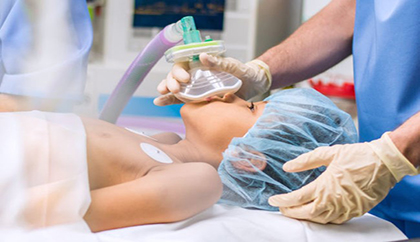
About the program
To give anesthesia is not difficult; but to give safe anesthesia is.
- Dr. Donald E. Hale Chairman of Anesthesiology Cleveland Clinic (1946-1967)
The Pediatric Anesthesiology Fellowship Program at Cleveland Clinic was established in 1999 under the leadership of Dr. Julie Niezgoda, the section head for pediatric anesthesiology, and Dr. Emad Mossad, the section head for congenital heart anesthesiology. The Department of Pediatric Anesthesiology was officially formed in 2006, and now operates under the Children’s Institute. Since its inception, 58 pediatric anesthesiologists have completed the fellowship. Currently 21 pediatric fellowship-trained physicians cover nearly 9,000 cases annually across eight dedicated pediatric operating rooms and more than seven remote locations.
The department is actively involved educating residents and fellows, as well as student nurse anesthetists, pediatric residents, emergency medicine residents, and critical care transport personnel. This strong educational focus contributes to the department’s growth and its ability to provide exceptional care for Cleveland Clinic’s youngest and most complex patients.
The Cleveland Clinic’s department of Pediatric Anesthesiology is an excellent place to learn, offering both world-class care for pediatric and adult patients undergoing a wide range of complex diagnoses. Trainees benefit from the unique opportunity to work with a high volume of complex cases, including congenital cardiac procedures, which are a hallmark of the Cleveland Clinic’s expertise. Our reputation for handling the most critically ill and youngest patients ensures that fellows gain a comprehensive hands-on experience in pediatric anesthesiology that is unparalleled.
Contact us
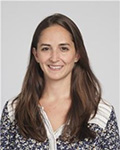
Lauren Licina, MD
Director, Pediatric Anesthesiology Fellowship Program
Phone: 216.445-7455 | Fax: 216.444.9247
Email: Licinal@ccf.org
Kassie Fedor, BBA
Program Coordinator
Email: Fedork2@ccf.org
Program Leadership

Lauren Licina, MD
Program Director
As a native Clevelander, returning home to the Cleveland Clinic after my medical education and training was one of the best decisions I’ve made. I am proud to be part of a tight-knit team that cares not only for our complex pediatric patients but also for each other. Our group fosters a family-like atmosphere with abundant mentoring opportunities for trainees and junior staff.
We are fortunate to work at a renowned institution alongside some of the best surgeons, interventionalists, nurses, and other team members, all committed to providing cutting-edge treatments for our pediatric patients.
Our fellowship program is intentionally small, allowing fellows to participate in multiple index cases and tailor their clinical experience to their specific goals and interests. Education is a cornerstone of our department, and we are excited to work with fellows who are passionate about the field of pediatric anesthesia.
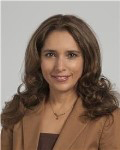
Pilar Castro, MD, MEd
Associate Program Director
A child’s surgery is a stressful time for patients and their families. As an anesthesiologist, I often meet family’s minutes before surgery, and I use that time to do what I can to put everyone at ease.
When I first started residency here, I didn’t know anyone in Cleveland. I told myself the best way to make friends is to be kind to people and to smile. We spend more time at work than at home. Kindness and having the disposition to always be helpful to others is the least we can do.
I love being part of a talented and collegial anesthesia team, where everyone is committed to do the best for each and every child we care for. Nurses, surgeons, technicians and the entire anesthesia team are constantly seeking opportunities to improve the quality of care.
Education Curriculum
The Cleveland Clinic Pediatric Anesthesiology Fellowship curriculum is designed to help fellows develop the knowledge, skills, and attitudes necessary to provide advanced perioperative care. Which includes general anesthesia or sedation for both routine and critically ill pediatric patients requiring surgery or non-painful procedures. Fellows have protected education time on Tuesday afternoons where they meet with various faculty members to explore a variety of timely topics.
Education offerings within the program include (but are not limited to):
- Congenital Cardiac Lecture Series
- Dedicated pain curriculum
- Formal career mentoring
- Grand Rounds series
- M&M Conferences
- Oral Board Review Course
- Pediatric Anesthesiology Fellow Lecture Series
- Pediatric Anesthesiology Fellow Orientation Series
- Pediatric Anesthesiology Fellow Boot Camps
- Perioperative Teaching by Pediatric Anesthesia Faculty
- Professional Development Series
- Simulations
Clinical Experience
The 13 module (4 weeks per module) Pediatric Anesthesiology Fellowship consists of:
- 5 modules Pediatric Operating/GENA
- 3 modules Pediatric Cardiac experience
- 1 module ICU
- 1 module Pediatric Acute Pain service
- 1 module Pediatric Ambulatory/ NORA (non operating room anesthesia)
- 1 module Advanced Pediatric Care (“Pretending” rotation)
- 1 academic day every 3 weeks throughout the year
- 15 vacation days
- 5 days for meetings and personal time
The Pediatric Anesthesiology Fellowship at Cleveland Clinic has a strong clinical experience with approximately 8,000 cases per year shared by:
- 6 Pediatric Operating Rooms
- 2 Pediatric Cardiac Operating Rooms
- 2 Pediatric Catheterization labs
- 2 Outpatient Ambulatory Surgery Center ORs
- Pediatric Electrophysiology labs
- Several remote areas which include the following:
- Cardiovascular Diagnostic Lab (CVDL)
- Position Emission Tomography Scan (PET scan)
- Nuclear Magnetic Resonance (NMR)
- Magnetic Resonance Imaging (MRI)
- Neurointerventional Radiology (NIR)
- Radiation therapy in the cancer institute
- CT, Interventional and Other Radiology Sites
Special highlights include:
- Robust Pediatric Transplant Program (heart, liver, kidney, and multivisceral organs)
- Fetal Surgery
- World Class Pediatric Cardiac Program
- Pediatric Pain Service
Career Development
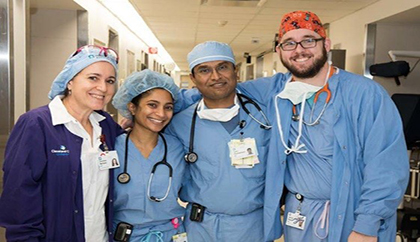
Mentoring
Incoming fellows are paired with an experienced faculty mentor to provide support throughout their fellowship year. The mentor’s role may vary, but ultimately, they are there to guide the fellow in areas such as career development, involvement in academic projects, and providing general assistance with day-to-day fellowship life.
Board preparation
From February to April each year, a dedicated group of faculty members helps prepare fellows for the ABA APPLIED Exam. Directed by ABA board examiners and other faculty members with expertise in medical education, the preparation includes:
- Routine group discussions with faculty moderators
- Mock Standardized Oral Examination (SOE) sessions
- Mock Objective Structured Clinical Examination (OSCE) sessions
Teaching opportunities
Fellows have the opportunity to assist in teaching medical students and anesthesiology residents during dedicated pediatric simulation sessions and in clinical cases. There are also opportunities to participate in courses within the Education Institute to develop teaching skills.
Scholarly activities
Fellows are required to participate in at least one academic research project during their fellowship year. Academic days will be allocated, and mentorship will be provided. The research project may involve joining an ongoing clinical or basic science study, or fellows may initiate a new project.
Quality improvement project
Each fellow also works with the department’s quality improvement officers to fulfill a QI project to benefit the care of our pediatric patients.
Clinical supervisory experience
During the final quarter of the fellowship year and the Advanced Pediatric Care rotation, fellows take on a clinical teaching and supervisory role with junior anesthesiology residents in the pediatric operating room. This experience allows fellows to refine their supervisory skills while still receiving direct oversight and support from faculty as needed.
Current Fellows
Meet Our 2025-2026 Fellows

Joyce Boutros, MD
- Hometown: Beirut, Lebanon
- Medical school: American University of Beirut
- Residency: American University of Beirut
- Why I chose Cleveland Clinic: Exceptional quality of care, wide variety of challenging cases, and the department’s collaborative and supportive environment

Jordan Fried, MD
- Hometown: East Meadow, NY
- Medical school: Sackler School of Medicine NY State/American Program, Tel Aviv
- Residency: Mount Sinai Medical Center of Florida, Miami Beach, Florida
- Why I chose Cleveland Clinic: The opportunity to work and learn at a prestigious hospital and experience a new city

Sul Hwa Shin, MD
- Hometown: São Paulo, Brazil
- Medical school: Federal University of São Paulo, Brazil
- Residency: Federal University of São Paulo, Brazil
- Why I chose Cleveland Clinic: Excellence in patient care, strong focus on education and training, and its amazing staff and community
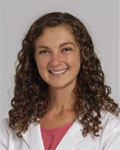
Morgan Stafford, MD (until 10/3/2025)
- Hometown: Raleigh, NC
- Medical school: Wake Forest School of Medicine
- Residency: Cleveland Clinic
- Why I Chose Cleveland Clinic: I went to residency here and enjoyed my time rotating with the peds department. The department is very welcoming, and the fellows get a great variety and complexity of cases
Application Process
The Pediatric Anesthesiology fellowship offers three positions each year. All positions are filled through the San Franscico Match (ACGME Program ID PR10110). Applications are accepted from January until May 31st.
We offer flexible start dates, with the majority of our fellows starting either July 1st or August 1st.
How to apply
Applications should be submitted via SF match and will include the following materials:
- CV
- Personal statement
- USMLE and/or COMLEX scores
- Three letters of recommendation (one must be from the Program Director)
- ECFMG Certificate (if applicable)
- ABA in-training scores and Basic Exam score
Application timeline
Interviews for fellowship positions will be held between April - June.
Applications will be accepted through May each year.
Interviews
Applicants that are being offered an interview will be notified via email . If interviews are held virtually, applicants will need to ensure they have a camera with a microphone available.
Resources
Training at Cleveland Clinic
We invite you to explore our Graduate Medical Education website to discover the reasons why Cleveland Clinic offers an ideal teaching and learning environment as well as to learn more about our rich tradition of excellence in the “education of those who serve.”
About Cleveland
From renowned cultural institutions to vibrant neighborhoods, inspired food and beverage offerings, action-packed sports and indie shops and art galleries, engaging experiences can be found around almost every corner in Cleveland. Learn more.